
Artwork Credit: Mahatab Rashid
On a dark night in Fargo, North Dakota, Humayun Ahmed found himself in the backseat of a car, his wife nervously navigating the highway for the first time.
As his anxiety peaked, a line from the song playing on the radio pierced through the tension: "Close your eyes and try to see." In that moment, amidst the hum of the engine and the unfamiliar roads, the seed of Misir Ali, a groundbreaking character in Bengali literature, was sown.
While I personally hold Sherlock Holmes in the highest regard, no other literary detective has ever truly captured my imagination. Each one seemed to bear the shadow of Holmes, lacking a distinct identity.
Misir Ali, however, defies convention. He is not a detective in the traditional sense, but an associate professor of Abnormal Psychology at Dhaka University, plagued by a myriad of health problems, including a persistent ulcer.
In "Ami O Amra," a doctor declares that Misir Ali suffers from nearly every ailment imaginable, from a damaged liver and a malfunctioning pancreas to heart issues and an abnormal white blood cell count.
Somresh Majumdar, a notable literary figure from West Bengal, effectively captures Misir Ali's health struggles. He once commented on the uniqueness of Misir Ali as a detective who deals with stomach issues:
"Picture a client eager to discuss a case, only for the detective to dash off to the bathroom, requiring a half-hour break before continuing the conversation," he joked.
This is precisely the Misir Ali we encounter in his debut novel, "Debi." He leaves his client, Anis, waiting for an entire day under the pretense of getting tea, only to fall asleep due to ulcer pain.
This unconventional first impression paints Misir Ali as irritable, abrupt, and aloof. However, beneath this facade lies a completely different personality.
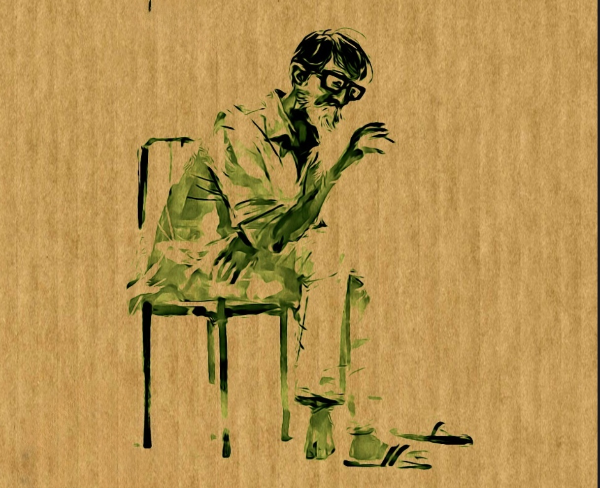
Why am I so drawn to
Misir Ali?
Misir Ali has become my favorite literary character because he transcends the typical detective archetype.
Humayun Ahmed masterfully crafted a truly original character, free from the looming influence of Arthur Conan Doyle. While faint echoes of Father Karras from "The Exorcist" might be discernible, Misir Ali ultimately stands as a unique and extraordinary creation.
Misir Ali's physical appearance remains somewhat elusive, varying slightly from novel to novel.
In "Debi," he is depicted as gaunt, with piercing eyes and unusually long fingers. Nilu's father in "Nishithini" describes him as thin, dark, and slightly hunched. Binu, in "Nishad," observes his thin frame, full beard and mustache, sparkling eyes, and gentle voice.
Mr. Barkatullah, in "Onno Bhubon," portrays him as thin and short, with a subtle pride in his speech, yet a simple and natural way of speaking.
Other characters offer contrasting impressions as well. Mr. Afsar, in "Bipod," sees him as thin and unremarkable, an ordinary man in a lungi, flustered when surprised by a guest. An old woman in "Anish" finds him intelligent but arrogant.
Himu, in "Himu's Second Phase," describes him as having a head of graying hair and an unremarkable appearance. Fatte, in "Baghbondi Misir Ali," notes his fluctuating demeanor, sometimes appearing foolish, sometimes incredibly astute.
Humayun Ahmed himself provides a vivid description in "Brihonnola," where he first introduces Misir Ali. He portrays him as exceptionally tall and thin, almost like a straight line, with a scarf around his neck and thick glasses.
His elongated face is framed by a beard and long hair, both slightly unkempt, mirroring the disheveled state of his black coat.
Initially, he gives the impression of a vagabond, but this quickly fades, replaced by a sense of shyness and an almost palpable embarrassment.
Humayun Ahmed surely defied convention in crafting Misir Ali. While most fictional detectives embody either logic or emotion, faith or skepticism, Misir Ali embraces both.
He is a character riddled with contradictions, mirroring the complexities of human nature. In "Debi," he professes atheism, yet in "Sangini," he declares himself a believer.
He acknowledges the inherent dilemmas within each person in "Nishad," revealing his own struggle between a yearning for connection and a deep-seated love for solitude.

The engrossing contrast
Despite his profession, Misir Ali harbors an aversion to mysteries.
In "Anish," he confidently asserts to an old woman that logic reigns supreme, capable of unraveling all the world's enigmas. Yet, in "Brihonnola," he admits that nature, while abhorring mystery, is inherently mysterious.
Though fiercely determined and unwilling to be defeated by the unknown, Misir Ali has, at times, surrendered certain events to the realm of the unexplained.
The roots of Misir Ali's inner turmoil likely lie in his childhood. His mother died when he was just two, leaving him under the sole influence of his deeply religious father, a madrasa teacher who instilled in him the power of faith.
Yet, his early years also planted the seeds of mystery. A chest belonging to his father, from which a woman's voice could be heard, remained a forbidden object throughout his childhood.
When his father died and the chest was finally opened, it was found to be empty, leaving the mystery of the voice unresolved. This incident, etched in Misir Ali's memory, represents his first encounter with the inexplicable, a defeat in the face of the unknown.
After his father's death, Misir Ali stays with a math teacher named Pranab. Upon seeing him, Pranab’s wife immediately says, "You will never enter my prayer room. Don’t say 'water'; say 'jal.' Bow to me, but don’t touch my feet; I’ve just bathed and am going to the prayer room."
Misir Ali bows, and she mocks him, saying, "Look at this Muslim boy, see how he bows."
Though there was no reason to like her at first glance, Misir Ali found himself drawn to her. She never asked him to call her 'mother,' yet he did so because she truly represented a maternal figure to him.
After her passing, he honored her last wish by performing her final rites. Her name was Durga.
The introduction of the goddess Devi in "Nishithini" marks a fascinating point in Misir Ali's journey. Despite his rational and skeptical nature, he finds himself seeking solace in the divine feminine during a moment of profound suffering.
"Relieve my suffering, Devi," he pleads, echoing the universal human cry for comfort in times of distress. This instinctive appeal to a higher power reveals a vulnerability that lies beneath Misir Ali's stoic exterior.
What makes this invocation even more intriguing is the connection it draws to Durga, the woman who provided Misir Ali with a maternal presence in his childhood.
Humayun Ahmed, who introduced Durga in "Sinduk" long after "Nishithini," names Misir Ali's first "mother" after this powerful Hindu goddess. Is this a deliberate parallel woven by the author, linking the divine feminine with the woman who nurtured Misir Ali in his youth?
Or is it a mere coincidence, a subconscious association that speaks to the universal human experience of seeking solace in a mother figure, both earthly and divine? There surely is a lot to ponder here.
Beyond mothers, many subsequent novels introduce various women—teenagers and young adults—who come to live with Misir Ali. They work, study, and care for him deeply.
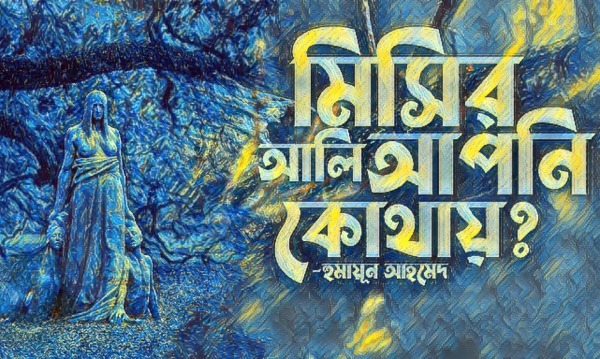
The extraordinary
compassion
Misir Ali's deep compassion for orphaned children is a recurring theme in many of his stories. This sensitivity may stem from his own childhood experiences. Could the unexpected love and care he received from an unfamiliar couple after losing all his loved ones have influenced how he approached life?
Misir Ali’s extraordinary capacity for compassion is strikingly depicted in Nishithini. One stormy July night, he finds a young girl named Hanifa huddled against a wall outside his home.
She becomes a part of his life, helping with household chores and learning to read and write under his guidance. One night, feverish and delirious, she murmurs, "Mummy, it hurts," a single phrase that serves as Misir Ali's only clue (he realized that the girl must be from some upper-class households) in his relentless quest to find her family.
Hanifa's father, a man of status and privilege, initially greets Misir Ali with disdain. This prejudice deepens when he learns that his daughter has been living with this stranger, performing domestic work.
Yet, the overwhelming relief of finding their lost child overshadows any lingering resentment. Their initial gratitude is expressed in a simple, almost understated, "Thank you for going through so much trouble to find me."
However, their departure is followed by a surprising turn. Misir Ali, a man often perceived as detached and aloof, finds himself unexpectedly moved to tears. He is struck by the depth of love he feels for this girl and the family he has reunited.
Shortly after, Hanifa's parents return. Perhaps the realization dawns on them that this seemingly ordinary man has shown their daughter extraordinary kindness, providing her with a safe haven and unwavering care.
They see him now not just as a stranger who helped them, but as someone who embodies compassion and selflessness.
Their return is filled with heartfelt emotion. They knock on his door, and then, overcome with gratitude, embrace him, tears streaming down their faces. "After getting close to home," the father confesses, "I felt that I didn’t thank you properly. You may not need my thanks; you are above ordinary people, but I am just an ordinary person, brother."
This outpouring of emotion reveals a profound shift in their perception of Misir Ali, recognizing him as an exceptional individual who embodies the very best of humanity.
"Brihonnola" paints a poignant picture of a lonely Misir Ali, hospitalized and disheartened by the lack of visitors. He shares his room with another patient, a man suffering from an ulcer, whose younger brother eagerly consumes the hospital's meager rice rations.
One day, the ulcer patient's condition improved slightly, allowing him to eat his own meal, leaving his brother hungry.
Witnessing this scene, Misir Ali is moved to tears, not out of sentimentality, but by a profound understanding of the pervasive poverty that shapes their lives. This quiet empathy deeply affects Humayun Ahmed, who, after meeting Misir Ali, writes: "For the first time, I understood that this person is not like the rest of us. This thin, half-mad man has the love of the ocean stored in his heart. Touching him is a blessing."
This sentiment echoes throughout other stories. In "Anish," an elderly woman, reunited with her long-lost son, writes to Misir Ali: "I have found my son. He is with me now. I don’t have the courage to face you... One day, I will send my son. You will give him a name and bless him by placing your hand on his head. Your sacred touch will make his life blessed."
She recognizes in Misir Ali a source of profound blessing, a power to bestow goodness through a simple touch.
Even Latifa, in "Jin Kofil," yearns for Misir Ali's touch. After he saves her child from a malevolent spirit, she is overcome with gratitude and a desire to connect with this extraordinary man.
With tears in her eyes, she reaches out, and Misir Ali responds by offering his hand, which she clasps with both of hers, weeping like a child.
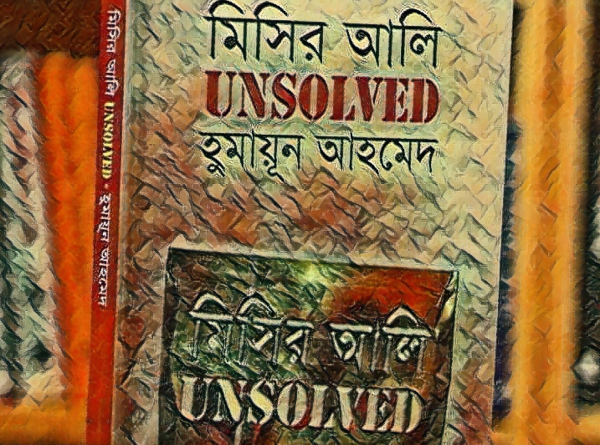
Not just a typical
sleuth
These instances reveal a fascinating facet of Misir Ali's character. He is not merely a solver of mysteries, but a figure imbued with an almost spiritual aura.
His touch becomes a symbol of healing, blessing, and connection, highlighting the profound impact he has on the lives of those around him. Misir Ali, in his quiet, unassuming way, embodies a rare and powerful form of humanity.
Misir Ali definitely possesses a remarkable intellect, characterized by an acute power of observation that often borders on the uncanny. This is vividly illustrated in two instances from Humayun Ahmed's novels.
In "Debi," Misir Ali's encounter with Ranu showcases his extraordinary ability to decipher subtle cues. After spending a brief period with her, he meticulously notes her behavior in his diary: "The girl has tugged at her sari's edge several times. Twice she has cleared her throat. I noticed that she lowered her head to drink water. Quite a bit lower, as if she wanted to hide the act of drinking."
These seemingly insignificant actions become crucial pieces in the puzzle he must solve. Ranu's repeated tugging at her sari hints at underlying discomfort, ultimately revealing a connection to sexual harassment.
Her throat-clearing betrays a dislike for solitude, while the act itself, along with the sari tugging, serves as a nervous release of tension. Her deliberate lowering of the head while drinking water points to a deeper tendency to conceal her true feelings and experiences.
Misir Ali, with his astute perception, recognizes these subtle signals, ultimately unraveling the truth behind Ranu's troubled state.
A similar instance of Misir Ali's keen observation is found in "Bipod." While meeting with Mr. Afsar, who seeks his help with a problem, Misir Ali engages in a seemingly odd act: he continues to sip from his empty teacup.
Mr. Afsar's wife initially dismisses this as forgetfulness, but later realizes the intentionality behind it. Misir Ali's deliberate action serves as a subtle probe into Mr. Afsar's mental state. While Mrs. Afsar notices the empty cup, Mr. Afsar remains oblivious, lost in his own troubled thoughts.
This stark contrast in awareness highlights Mr. Afsar's precarious mental state, a fact brought into sharp focus by Misir Ali's seemingly trivial gesture. It is in this moment that Mr. Afsar recognizes the true depth of Misir Ali's intelligence, masked behind his unassuming demeanor.
These examples demonstrate Misir Ali's unique ability to perceive and interpret the unspoken language of human behavior.
He sees beyond the surface, recognizing the significance of seemingly insignificant details, ultimately using these observations to understand and address the complexities of the human condition.
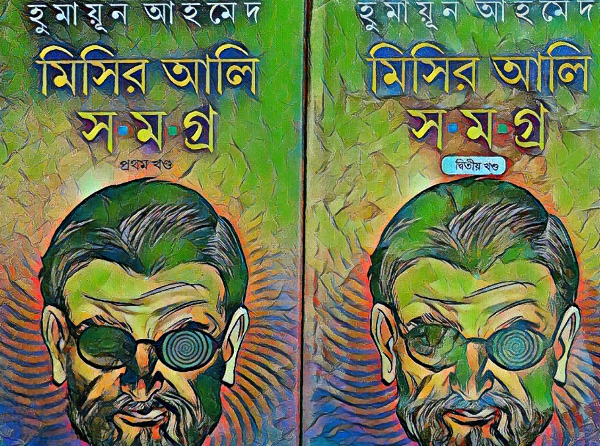
The mystery and the
unvoiced aspects
Misir Ali remains a character best understood by his author. Humayun himself portrayed Misir Ali as forgetful, a trait evident in instances like his repeated visits to Humayun's house, each time leaving something behind.
This forgetfulness, however, is just one facet of his complex personality. He can be remarkably deliberate, as seen in his calculated act of sipping from an empty teacup in "Bipod," leaving the reader to question where genuine forgetfulness ends and conscious action begins.
This ambiguity is a defining characteristic of Misir Ali, making him a perpetually intriguing and unpredictable figure.
While his observational skills are undoubtedly sharp, they are not without their limitations. Misir Ali is far from infallible, often making mistakes and taking a slow, methodical approach to unraveling mysteries.
He meticulously gathers information, poring over newspapers and patiently piecing together clues. His stubborn nature, while sometimes leading him to the truth, can also hinder his progress, preventing him from solving every case he encounters.
Curiosity is another defining trait, and its depths are difficult to fathom. He may appear indifferent to a story at first, only to become completely engrossed upon hearing a mere fragment.
A glimpse of someone's darkened tongue can be enough to pique his interest and draw him into their problems. This insatiable curiosity, however, can also lead him into trouble, as seen in "Debi" where his repeated visits to Ranu's village result in hospitalizations.
Even while suffering from a severe headache, his mind remains active, pondering the curious nature of visual perception. A gifted blanket will be meticulously examined for loose threads, potentially sparking a new obsession.
Despite his inconsistencies and eccentricities, Misir Ali remains an iconic figure in the realm of mystery and detective fiction. Across his twenty novels and numerous short stories, he may have completely solved only thirteen cases, with partial successes in a handful of others.
Yet, his failures do not diminish his appeal. It is his unwavering determination, his relentless pursuit of truth, that captures our imagination.
Whenever mysteries and their solutions are discussed, it is Misir Ali's thin, inquisitive face that comes to mind, a testament to his enduring presence in the world of Bengali literature.
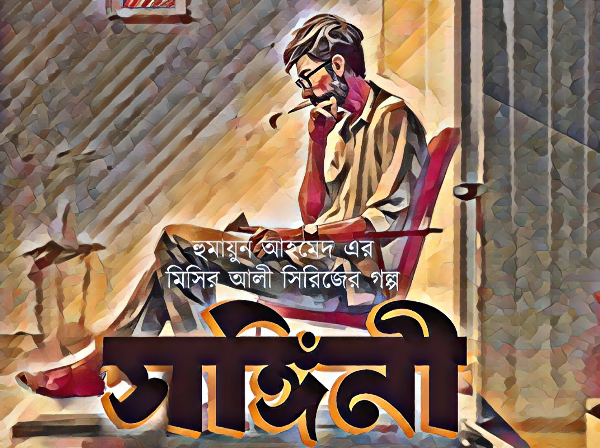
The lasting image
When we think of Jon Snow from Game of Thrones, the iconic image of him standing alone, sword in hand, amidst the chaos of the Battle of the Bastards instantly springs to mind.
Despite facing overwhelming odds, he stands his ground, embodying a courage that transcends mere survival. This unwavering resolve, this refusal to yield even in the face of imminent defeat, is what makes Jon Snow such a compelling figure.
It reminds us that sometimes, simply refusing to back down can be a victory in itself.
Misir Ali shares this same indomitable spirit. He confronts his adversaries with a quiet courage that borders on the superhuman.
In "Baghbandi," he faces the formidable psychic powers of Fatte, alone and vulnerable in a small boat on a river. In "Aami Misir Ali," he stands before the Sultan, defying death threats with unwavering logic. Even against Thinni, the series' most potent antagonist in "Onnobhubon," Misir Ali refuses to be completely dominated, preventing a second mental invasion.
He fearlessly exposes Sudhakanta Babu's heinous crime, unraveling a complex mystery with his sharp intellect. And in "Nishithini," he repeatedly confronts Firoz, knowing the danger, yet armed with his unwavering logic and determination.
The Misir Ali series begins and ends with a sense of haunting mystery. It opens on a stormy night, with Ranu's sleep disturbed by fear, a fear Misir Ali cannot alleviate.
It concludes on another stormy night, with Misir Ali bidding farewell to Champa, the one person he was able to truly help. He gazes at her with admiration, murmuring a poignant verse about the autumn moon, leaving us with a lingering sense of melancholy.
Humayun Ahmed then takes Misir Ali away, transporting him to a realm beyond our reach, a world free from sorrow and overflowing with mystery.
Yet, we sense that Misir Ali's inquisitive spirit persists. We imagine him peering through the windows of an old house in that otherworldly realm, still seeking to unravel mysteries, perhaps even aware of us, his devoted readers, watching from the other side.
And on certain rainy nights, we feel his absence keenly, like the lack of blue roses in a garden overflowing with blooms, a poignant reminder of the unique and irreplaceable presence that was Misir Ali.
—-
Shakhawat Hossen is a writer
(Translated from Bangla by Faisal Mahmud)

